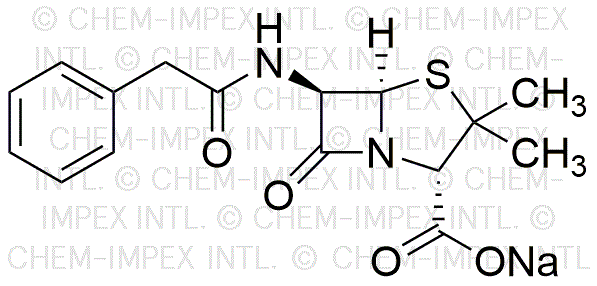Penicillin G sodium salt is widely utilized in research focused on:
- Antibiotic Treatment: This compound is primarily used to treat bacterial infections, particularly those caused by Gram-positive bacteria. It is effective in clinical settings for conditions like pneumonia and meningitis.
- Veterinary Medicine: In veterinary practices, it is administered to livestock and pets to combat infections, ensuring animal health and productivity in agriculture.
- Pharmaceutical Development: Researchers use it as a standard reference in the development of new antibiotics, helping to evaluate the efficacy of novel compounds against bacterial strains.
- Biotechnology Applications: In biotechnological processes, it serves as a selective agent in the production of penicillin derivatives, aiding in the development of more effective antibiotics.
- Laboratory Research: It is commonly employed in microbiology labs to study bacterial resistance mechanisms, providing insights that can lead to improved treatment strategies.
Informations générales
Propriétés
Sécurité et réglementation
Applications
Penicillin G sodium salt is widely utilized in research focused on:
- Antibiotic Treatment: This compound is primarily used to treat bacterial infections, particularly those caused by Gram-positive bacteria. It is effective in clinical settings for conditions like pneumonia and meningitis.
- Veterinary Medicine: In veterinary practices, it is administered to livestock and pets to combat infections, ensuring animal health and productivity in agriculture.
- Pharmaceutical Development: Researchers use it as a standard reference in the development of new antibiotics, helping to evaluate the efficacy of novel compounds against bacterial strains.
- Biotechnology Applications: In biotechnological processes, it serves as a selective agent in the production of penicillin derivatives, aiding in the development of more effective antibiotics.
- Laboratory Research: It is commonly employed in microbiology labs to study bacterial resistance mechanisms, providing insights that can lead to improved treatment strategies.
Documents
Fiches de données de sécurité (FDS)
La FDS fournit des informations de sécurité complètes sur la manipulation, le stockage et l’élimination du produit.
Spécifications du produit (PS)
Le PS fournit une description complète des propriétés du produit, notamment sa composition chimique, son état physique, sa pureté et les exigences de stockage. Il détaille également les plages de qualité acceptables et les applications prévues du produit.
Certificats d'analyse (COA)
Recherchez des certificats d'analyse (COA) en saisissant le numéro de lot du produit. Les numéros de lot et de lot se trouvent sur l'étiquette d'un produit, après les mots « Lot » ou « Lot de fabrication ».
Numéro de catalogue
Numéro de lot/série
Certificats d'origine (COO)
Ce certificat d'exploitation confirme le pays dans lequel le produit a été fabriqué, et détaille également les matériaux et composants utilisés et s'il est issu de sources naturelles, synthétiques ou autres sources spécifiques. Ce certificat peut être requis pour les douanes, le commerce et la conformité réglementaire.
Numéro de catalogue
Numéro de lot/série
Fiches de données de sécurité (FDS)
La FDS fournit des informations de sécurité complètes sur la manipulation, le stockage et l’élimination du produit.
DownloadSpécifications du produit (PS)
Le PS fournit une description complète des propriétés du produit, notamment sa composition chimique, son état physique, sa pureté et les exigences de stockage. Il détaille également les plages de qualité acceptables et les applications prévues du produit.
DownloadCertificats d'analyse (COA)
Recherchez des certificats d'analyse (COA) en saisissant le numéro de lot du produit. Les numéros de lot et de lot se trouvent sur l'étiquette d'un produit, après les mots « Lot » ou « Lot de fabrication ».
Numéro de catalogue
Numéro de lot/série
Certificats d'origine (COO)
Ce certificat d'exploitation confirme le pays dans lequel le produit a été fabriqué, et détaille également les matériaux et composants utilisés et s'il est issu de sources naturelles, synthétiques ou autres sources spécifiques. Ce certificat peut être requis pour les douanes, le commerce et la conformité réglementaire.


